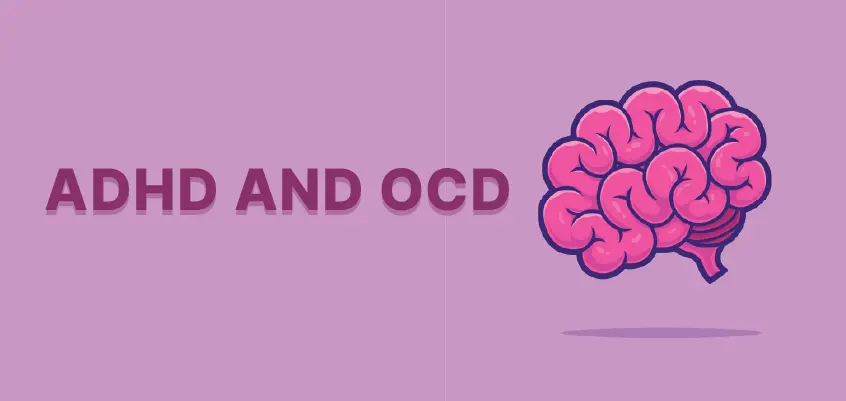Introduction
Attention deficit hyperactivity disorder (ADHD) and obsessive-compulsive disorder (OCD) are different mental health conditions that can affect how a person functions daily. Although they have some shared symptoms, it can be challenging to distinguish between the two. While uncommon, some people may experience ADHD and OCD simultaneously, making diagnosis and treatment more complicated. This article will explore the similarities and differences between these two conditions, their causes, symptoms, and available treatment options.
Similarities between ADHD and OCD
As mentioned earlier, ADHD and OCD share some overlapping symptoms, which include:
Impulsivity: Both ADHD and OCD can lead to problems with impulsivity. People with ADHD may act impulsively without considering the consequences. In contrast, people with OCD may feel compelled to act on obsessive thoughts or compulsive behaviors even if they don’t want to.
Read this article to get more information of impulsivity.
Difficulty with attention and focus: Both disorders can cause problems with concentration, stress, and organization. People with ADHD may struggle to pay attention to tasks or stay organized. In contrast, people with OCD may get caught up in obsessive thoughts and compulsive behaviors that interfere with their ability to focus on other tasks.
Negative impact on social relationships and academic/work performance: Both conditions can negatively affect social relationships and academic/work performance. People with ADHD may struggle to maintain relationships or perform well at school or work. In contrast, people with OCD may find it challenging to focus on anything other than their obsessions or compulsions.

Differences between ADHD and OCD
ADHD is a neurodevelopmental condition that affects around 5-10% of children and 2-5% of adults globally. It is characterized by inattention, hyperactivity, and impulsivity symptoms that can impact an individual’s daily functioning. Inattention symptoms may include forgetfulness, carelessness, difficulty paying attention to details, and easy distractibility. Hyperactivity symptoms may include fidgeting, restlessness, and difficulty remaining seated, while impulsivity symptoms may manifest as interrupting others, impatience, and acting without considering the consequences.
OCD is a mental health condition characterized by uncontrollable, repetitive behaviors or compulsions and persistent, unwanted thoughts or obsessions. These compulsions aim to alleviate anxiety or distress caused by those thoughts. OCD may manifest as excessive cleaning, counting, ordering, or arranging, and can become time-consuming and interfere with daily functioning. Individuals with OCD may also experience intrusive thoughts that cause distress or discomfort.
While there are some similarities between ADHD and OCD, some significant differences distinguish the two disorders. The differences are evident in both disorders’ symptoms, causes, diagnosis, and treatment.
Read this article for more information of impulsivity.
Symptoms of ADHD and OCD:
The symptoms of ADHD and OCD differ. Symptoms of hyperactivity, forgetfulness, and distractibility mark ADHD. In contrast, OCD is characterized by recurrent, intrusive thoughts or obsessions and repetitive behaviors or compulsions such as excessive cleaning or checking.
Causes of ADHD and OCD
The underlying causes of ADHD and OCD are distinct. ADHD is believed to stem from issues with the dopamine and norepinephrine systems in the brain, whereas OCD is linked to problems with the brain’s serotonin system.
Diagnosis of ADHD and OCD
The diagnosis of ADHD is typically based on symptoms, as there is no specific test that can be definite.
The diagnosis of OCD is generally made based on the presence of obsessions and compulsions that significantly distress or impair a person’s daily functioning. A healthcare provider may also perform a physical examination and medical tests to exclude any underlying medical conditions causing the symptoms.
Treatment OF ADHD and OCD
The treatment of ADHD generally involves a combination of medications and behavioral therapy. Stimulant medications that elevate dopamine and norepinephrine levels, such as those used to treat ADHD symptoms, are frequently utilized. These medications boost neurotransmitter levels in the brain, which may improve focus, decrease impulsivity, and reduce hyperactivity.
Behavioral therapy can also be an effective way to manage symptoms of ADHD. This therapy concentrates on teaching individuals coping techniques to deal with ADHD symptoms, such as enhancing organizational abilities, reducing impulsivity, and managing time efficiently. Behavioral therapy may also entail working with parents or caregivers to help them comprehend and manage their child’s symptoms.
The treatment of OCD typically involves a combination of medications and behavioral therapy. Selective serotonin reuptake inhibitors (SSRIs) are commonly used to manage symptoms of OCD, as they increase serotonin levels in the brain, which can help reduce the intensity of obsessions and compulsions. In addition to medication, cognitive-behavioral therapy (CBT) can effectively manage OCD symptoms. CBT focuses on changing negative thought patterns and behaviors contributing to OCD and may involve exposure and response prevention (ERP). ERP gradually exposes the individual to their obsession while preventing compulsive behavior, which can help reduce the intensity of the obsession and compulsions over time.
Conclusion
ADHD and OCD are two distinct mental health disorders that can affect an individual’s daily life and functioning. Although they share similar symptoms, such as problems with attention and focus and difficulties with impulsivity, their underlying causes, symptoms, and treatments differ. Someone can have ADHD and OCD simultaneously, making diagnosis and treatment more challenging. It is crucial to seek professional help if you or a loved one are experiencing symptoms of ADHD or OCD to receive an accurate diagnosis and appropriate treatment.
ABOUT US
The United We Care application is designed to offer assistance with mental health, such as providing coping mechanisms, prompts for journaling, and setting goals. It also includes access to online therapy sessions with mental health experts specializing in ADHD and OCD treatment. The application can be downloaded from the Apple Store and Google Play Store.
REFERENCES
[1] F. A. Rebecca Joy Stanborough, “ADHD and OCD: They can occur together,” Healthline, 24-Mar-2021. [Online]. Available: https://www.healthline.com/health/mental-health/adhd-and-ocd. [Accessed: 04-May-2023].
[2] P. H. Zia Sherrell, “ADHD vs. OCD: Differences, symptoms, treatment, and more,” Medicalnewstoday.com, 29-Sep-2021. [Online]. Available: https://www.medicalnewstoday.com/articles/adhd-vs-ocd. [Accessed: 04-May-2023].
[3] R. Olivardia, “When OCD and ADHD coexist: Symptom presentation, diagnosis, and treatment,” ADDitude, 18-Mar-2021. [Online]. Available: https://www.additudemag.com/ocd-adhd-comorbid-symptoms-diagnosis-treatment/. [Accessed: 04-May-2023].










